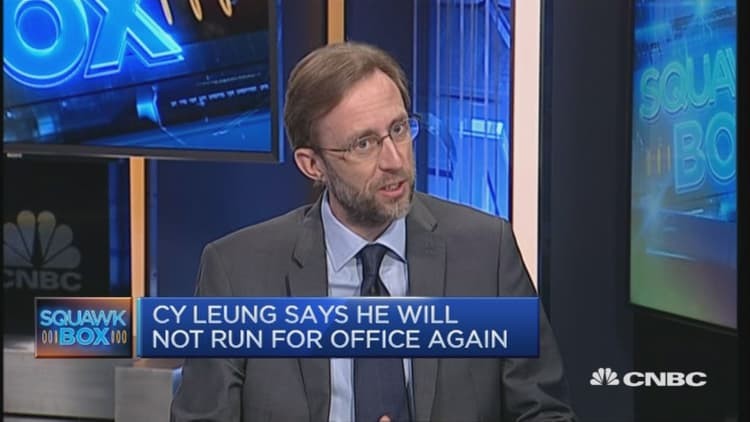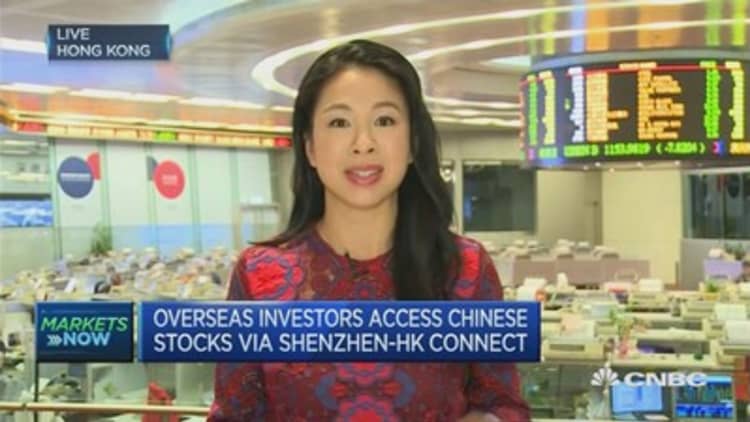China may have the final say on who becomes Hong Kong's next leader, but candidates will still have to pass a tough popularity test at home.
Following news that current Chief Executive CY Leung will not be seeking re-election in March 2017, five contenders have emerged to take on the city's top government post. But before getting Beijing's final tick of approval, they must first gain support among a public fraught by contrasting attitudes towards the mainland and issues of independence.
"The central government wants this to be as close to a genuine election as possible. What is quite clear that given CY Leung's announcement, the mainland does not want him to stay, so that means Beijing wants this election to have a more, collaborative approach," Linda Li, professor of political science at the City University of Hong Kong, told CNBC on Tuesday.
CY Leung remains unpopular among many Hong Kongers for his government's hardline stance, a fact that may have cost him Beijing's support.
Only one candidate, retired judge Woo Kwok-hing, has made his bid official so far. But others are widely expected to announce their intentions soon, including Chief Secretary Carrie Lam, who previously had insisted she would be retiring next year, former security chief Regina Ip, outgoing Financial Secretary John Tsang and former president of the Legislature Jasper Tsang.
As a special administrative region of the mainland, Hong Kong is unable to democratically elect its own leaders, with Beijing ruling out open nominations in 2014. The chief executive must first be elected through an Election Committee and then officially appointed by China's government.
Hong Kongers are able to elect members to the committee but just 230,000 people, or six percent of the total electorate, are allowed to cast ballots. Voting began on Sunday, with the pro-democracy camp, called the pan-democrats, securing 325 out of the Committee's available 733 seats—their best performance ever. Pro-establishment members are expected to make up the remainder of the Committee. A total of 600 votes are needed for a candidate to win.
China will eventually make clear who its favorite candidate is but first, it will want to wait and see how the candidates test public opinion, explained Tim Summers, senior consulting fellow, Asia Program at Chatham House.
Amid a tumultuous year that has seen more citizens grow increasingly resentful towards Beijing, "they want a chief executive who's as popular as possible," Summers added. "Someone who has the trust of Beijing and enough popularity among Hong Kong people, which is tough to reconcile."


The city is meant to enjoy high levels of autonomy from China under a principle known as 'One Country, Two Systems,' but a spate of recent episodes, from the 2015 disappearance of local booksellers who were openly critical of China's Communist Party to the recent detention of activist Joshua Wong in Bangkok, suggests increasing Chinese interference in domestic affairs.
And this charged political terrain will not be easy for any of the five pro-establishment candidates to tread on.
"There's a growing polarization of politics. It's difficult for people to get together and agree on any sort of issue in this town at the moment. So, the challenge for any chief executive is how to deal with this fragmented, difficult political atmosphere," said Summers.
Indeed, the city has witnessed considerable political strife recently, from physical brawls in the Legislative Council on Nov. 2 to fresh street rallies over the weekend against the city's biased electoral system. Sharp political divisions were clearly reflected in the aftermath of Beijing's Nov. 7 historic ruling on a court case involving two pro-independence politicians.
Separate protests, some in favor and against Beijing's ruling, rocked the city's streets last month, shining fresh light on the contentious issue of Hong Kong's future.
"One of the features of this fragmented political scene is that there's no one candidate [for chief executive] who's universally popular," remarked Summers.
Responding to long-standing public frustration over socioeconomic matters, such as elevated home prices, income inequality, pension systems and a high standard of living, will be another obstacle for candidates as they connect with the masses to gain China's favor.

